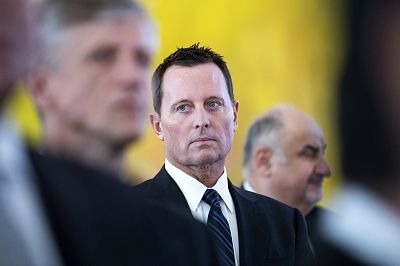The Senate must confirm as DNI a Texas congressman who inflated his resume, or leave in place an acting director without significant intel experience.
WASHINGTON — With the country distracted by a spreading coronavirus and a Democratic primary battle, President Donald Trump appears to have boxed in the Senate on the crucial question of who will lead the intelligence community in the months leading up to the November election.
At issue is the job of director of national intelligence, which is coordinating the information-gathering about, and response to, foreign interference in American politics. Through a series of moves, Trump has presented senators with what many see as an unpalatable choice, multiple congressional aides of both parties told NBC News: Either confirm a conservative Texas congressman who misrepresented his background, or leave in place as acting director a political firebrand with no experience in the intelligence world.
"We're damned if we do and damned if we don't," one Democratic aide said. "It's a terrible dilemma."
It began when Trump pushed out his acting director of national intelligence — retired Navy Vice Adm. Joseph Maguire — over a classified election security briefing that Trump did not like, multiple current and former officials told NBC News. The president then installed as the acting director his ambassador to Germany, Richard Grenell, a Trump loyalist without significant intelligence experience.
On Friday, Trump announced that his pick to permanently fill the Senate-confirmed post is Rep. John Ratcliffe, R-Tex. Ratcliffe was also Trump's choice last year, but he withdrew from consideration amid revelations he had inflated his credentials. His web site said he had "put terrorists in prison" as a federal prosecutor in Texas, but there is no record of him ever prosecuting a terrorism case.
Ratcliffe, who serves on the House Intelligence Committee, was among the fiercest critics of special counsel Robert Mueller during televised hearings in July, just before Trump picked him to manage the spy agencies.
"I think the president is in a completely different position today than he was in July," said John Brabender, a Republican political consultant. "He came through impeachment stronger than ever and he's seen as much more likely to be re-elected. I think the president can write the rules to a greater extent than he could back months ago."
Since the job of DNI was created , it has been filled by people with deep intelligence experience. Trump's first DNI, Dan Coats, was the first who hadn't served in a national security job, but he had spent years as a Republican senator overseeing national security agencies. Ratcliffe, first elected in 2014, first joined the intelligence committee last year.
Senate Republicans had privately balked at the Ratcliffe nomination in July, Congressional aides said. But this time might be different. The reason: By nominating Ratcliffe, Trump extended the legal limit on the time Grenell can remain acting director by another 210 days, which would leave him in place through the November election unless Ratcliffe is confirmed.
Richard Burr, R-N.C., the chairman of the Senate Intelligence Committee, issued a statement in response to Trump's announcement Friday that neither endorsed nor criticized Ratcliffe.
"There is no substitute for having a permanent, Senate-confirmed Director of National Intelligence in place to lead our [intelligence community]," said Burr. "I look forward to receiving Congressman Ratcliffe's official nomination and ushering it through the Senate's regular order."
Some Democrats assumed that Trump's intent by nominating Ratcliffe was to allow Grenell to remain in place through the election.
"Ratcliffe's nomination is not a serious nod," Ned Price, a former Obama national security aide and NBC News contributor, wrote in a message to Democratic activists last week. "It was clear last summer — based on his scant intelligence experience, hyper-partisanship, embrace of conspiracy theories, and embellishment of his resume — that Ratcliffe's nomination would not survive the Senate. ... This is nothing more than an effort to reset the clock on Ric Grenell's term as Acting DNI."
But some Democrats are starting to wonder whether it's the other way around — Trump is counting on their distaste for Grenell to boost Ratcliffe's chances.
Ratcliffe, meanwhile, is defending his record.
"I've been handling national security issues as far back as 2005," he told Catherine Herridge of CBS News. "I haven't served in an intelligence agency. I think that bringing a different kind of experience today is really going to be vitally important. You know all of the experience in the world isn't helpful without judgment, and I think what we've seen is that some of our most experienced intelligence officials have gotten it wrong with respect to important issues."
The White House did not respond to a request for comment.












